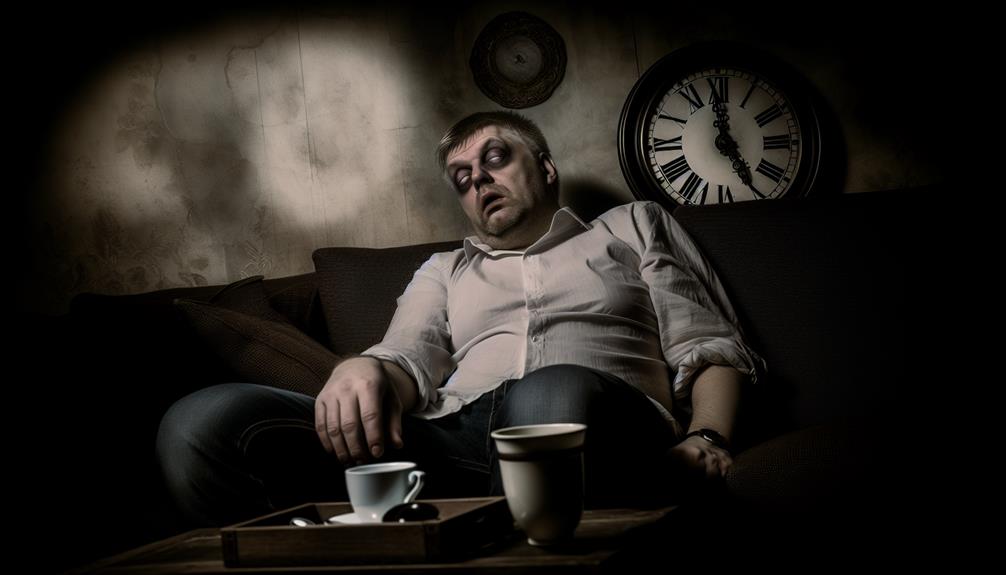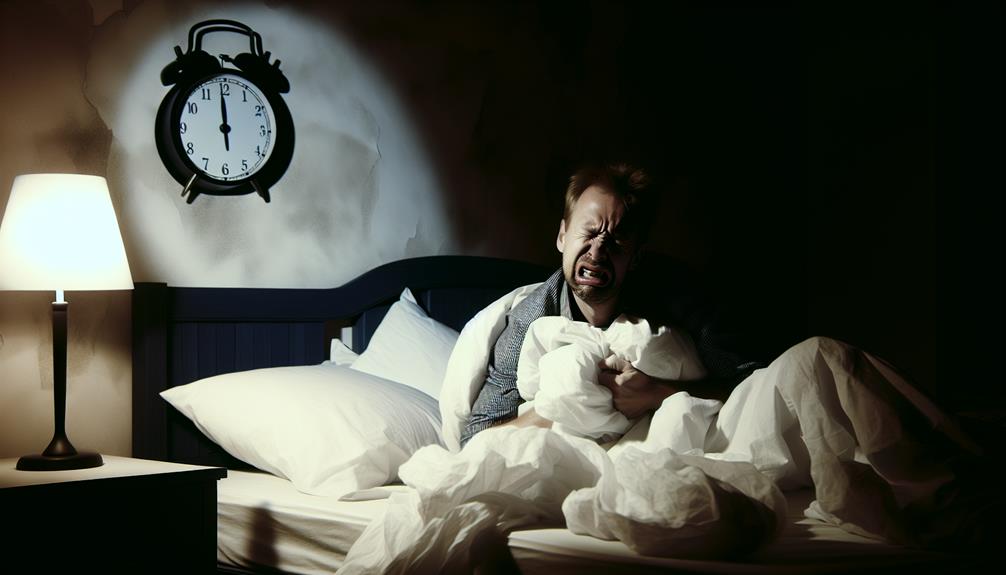If I recognize signs of hormonal imbalance in men, I often notice fatigue and low energy as primary indicators. Mood swings and irritability can also surface, especially when testosterone levels drop. Decreased libido is another common sign, often linked to hormonal fluctuations. Changes in body composition, like increased fat and reduced muscle mass, are significant too. Sleep disturbances, including insomnia and night sweats, can disrupt my rest. Furthermore, changes in body hair or conditions like gynecomastia might occur. Understanding these symptoms can guide appropriate action and lead to valuable insights about managing hormonal health effectively.
Fatigue and Low Energy

Fatigue can be a frustrating experience, often signaling an underlying hormonal imbalance in men. It's not just about feeling tired; it can indicate issues with adrenal fatigue and testosterone levels. When I first encountered persistent fatigue, I realized it could stem from my adrenal glands not producing enough hormones to cope with stress. These glands play a essential role in regulating energy levels and overall well-being.
Low testosterone levels can also contribute notably to how energetic I feel. Testosterone is fundamental for maintaining muscle mass, bone density, and energy levels. When testosterone levels drop, which can happen due to age or other factors, I noticed that my stamina and motivation dwindled. I found myself feeling drained after minimal exertion, which was disheartening.
The interplay between adrenal fatigue and testosterone levels can create a vicious cycle. If my adrenal glands are overworked, they can lead to a decrease in testosterone production. This, in turn, exacerbates feelings of fatigue, making it even harder to break free from the cycle.
I learned that identifying these signs early is essential for addressing hormonal imbalances. By consulting a healthcare professional, I could explore treatment options that might include lifestyle changes, dietary adjustments, or hormone therapy. Recognizing the symptoms of fatigue and understanding their potential hormonal causes has helped me take proactive steps toward restoring my energy and vitality.
Mood Swings and Irritability
I've noticed that mood swings and irritability can be significant indicators of hormonal imbalance in men. These emotional fluctuations not only affect personal well-being but can also strain relationships. Understanding this connection is essential for addressing both emotional health and interpersonal dynamics.
Emotional Fluctuations Overview
Although emotional fluctuations can occur for various reasons, hormonal imbalances in men often manifest as notable mood swings and irritability. I've noticed that this can be linked to changes in testosterone levels, which play an essential role in emotional regulation. When testosterone dips, I tend to experience heightened irritability and mood swings that can seem disproportionate to the situation at hand.
Understanding these fluctuations is vital for managing them effectively. Incorporating stress management techniques, such as mindfulness or regular exercise, has been beneficial for me. These practices not only help in maintaining emotional stability but also bolster my emotional resilience, allowing me to navigate challenging situations with greater ease.
It's important to recognize these signs early. If you find yourself increasingly irritable or emotionally volatile, it might be a signal of an underlying hormonal issue. Consulting a healthcare professional can provide clarity and direct you towards appropriate interventions. Remember, addressing hormonal imbalances can considerably improve not just emotional well-being but overall quality of life. Taking proactive steps can empower you to regain control over your emotions and enhance your daily interactions.
Impact on Relationships
Steering through the complexities of relationships can be particularly challenging when mood swings and irritability arise from hormonal imbalances. These emotional fluctuations often create communication barriers, making it difficult to express feelings clearly. As a result, emotional disconnect can intensify, leading to relationship strain. My partner and I might find ourselves arguing over trivial matters, which, in reality, are symptoms of deeper intimacy issues rooted in my hormonal state.
Trust challenges may also emerge, as my unpredictable moods can leave my partner feeling uncertain about my feelings toward them. They may question whether my irritability is a reflection of their shortcomings or just a symptom of my imbalance. It's essential to address these support needs openly; without partner awareness, misunderstandings can fester.
To mitigate conflict resolution, I've learned the importance of transparent dialogue. I endeavor to communicate my emotional state, helping my partner understand that my irritability isn't personal. By fostering a supportive environment, we can navigate these challenges together, reinforcing our bond and ensuring that hormonal fluctuations don't derail our relationship.
Decreased Libido

When a man experiences a significant decrease in libido, it often serves as a essential indicator of hormonal imbalance. This issue can stem from various factors, but most importantly, it typically relates to fluctuations in testosterone levels. Testosterone is fundamental for maintaining sexual desire, and when its production declines, I often find that men may notice a substantial drop in their libido.
Several libido triggers can influence this decrease. Stress, anxiety, and depression are common psychological factors that can disrupt hormonal equilibrium. Additionally, lifestyle choices, such as poor diet, lack of exercise, and inadequate sleep, can further exacerbate the situation. It's imperative to recognize these triggers, as addressing them may help restore hormonal balance.
If you're experiencing decreased libido, seeking medical advice is fundamental. Healthcare professionals often recommend hormonal treatments as a way to manage the symptoms associated with hormonal imbalance. These treatments can include testosterone replacement therapy, which aims to restore testosterone levels to a healthy range, thereby enhancing libido. It's important, however, to approach such treatments with caution and under the guidance of a qualified physician to avoid potential side effects.
Weight Gain and Body Changes
I've noticed that hormonal imbalances can lead to significant changes in body composition, particularly regarding increased body fat and reduced muscle mass. These shifts not only affect physical appearance but can also correlate with changes in libido. Understanding these connections is essential for identifying and addressing potential hormonal issues.
Increased Body Fat
Increased body fat can be a notable indicator of hormonal imbalance in men, often manifesting as unexpected weight gain or changes in body composition. I've noticed that this condition frequently correlates with fluctuations in hormones like testosterone and cortisol. When these hormones are out of balance, it can lead to an increase in adipose tissue, particularly around the abdomen.
Dietary influences play an essential role here. A diet high in processed foods and sugars can exacerbate weight gain, especially when combined with hormonal fluctuations. It's important to be mindful of what I eat, as certain foods can trigger hormonal responses that promote fat storage.
If I suspect a hormonal imbalance, undergoing hormonal tests can provide valuable insight. These tests can help identify specific deficiencies or excesses in hormones, guiding my approach to treatment. Addressing the underlying hormonal issues, alongside making dietary adjustments, can greatly impact body fat levels. Recognizing the connection between increased body fat and hormonal imbalance is fundamental for effective management and overall health improvement.
Muscle Mass Reduction
Muscle mass reduction often accompanies hormonal imbalances, markedly affecting overall body composition. As I've experienced, this decline in muscle can be linked to decreased testosterone levels, which play a significant role in muscle development and maintenance. It's been frustrating to notice changes in my body, especially when I've consistently engaged in strength training.
I've observed three specific changes that signify muscle mass reduction:
- Decreased Strength: Lifting weights feels increasingly challenging, and I struggle to progress in my workouts.
- Increased Fatigue: Recovery times seem longer, and I often feel fatigued even after a light workout, affecting my motivation.
- Altered Body Shape: My physique is shifting; I notice more definition loss in areas that used to be well-defined, contributing to an overall softer appearance.
These signs point to the need for a more extensive approach to address hormonal health. If you're facing similar issues, it's essential to consult a healthcare professional to evaluate your testosterone levels and explore potential treatment options. Staying informed and proactive can make a significant difference in reclaiming your strength and energy.
Changes in Libido
Libido can greatly fluctuate due to hormonal imbalances, often manifesting alongside unwanted weight gain and changes in body composition. I've noticed that these libido fluctuations can profoundly impact my sexual health. When hormones like testosterone dip, it can lead to not only a reduced interest in sexual activity but also unwanted physical changes.
Here's a breakdown of key factors:
| Factor | Impact on Libido | Associated Body Changes |
|---|---|---|
| Low Testosterone | Reduced sexual desire | Increased body fat |
| Elevated Estrogen | Decreased libido | Gynecomastia (breast tissue) |
| Stress Hormones | Impaired sexual function | Weight gain |
| Poor Diet | Low energy, low libido | Muscle loss |
| Lack of Exercise | Decreased testosterone | Weight gain |
Recognizing these signs can be vital for addressing the underlying hormonal issues. If you're experiencing similar changes, it's essential to consult a healthcare professional. Understanding how hormonal imbalances affect libido and body changes can empower us to make informed decisions about our sexual health and overall well-being.
Sleep Disturbances

When we consider the effects of hormonal imbalance in men, sleep disturbances often emerge as a significant indicator. Hormones play a vital role in regulating sleep quality, and when they're out of balance, it can lead to a cascade of sleep-related issues. I've seen how men experiencing hormonal fluctuations often report various sleep disturbances, which can severely impact their daily lives.
Here are three common sleep issues that can arise from hormonal imbalance:
- Insomnia: Difficulty falling or staying asleep can occur, leading to chronic fatigue and irritability.
- Night Sweats: Increased sweating during the night can disrupt sleep cycles, making it hard to achieve restorative sleep.
- Sleep Apnea: Hormonal changes may exacerbate conditions like sleep apnea, characterized by interrupted breathing during sleep.
These disturbances can act as a significant signal that your body's hormonal regulation is off-kilter. For instance, low testosterone levels have been linked to insomnia and decreased sleep quality, while fluctuations in cortisol can lead to night sweats. Recognizing these signs is essential for addressing the underlying hormonal issues.
If you're experiencing these symptoms, it's important to consult with a healthcare professional. They can provide insights into how hormonal imbalance may be affecting your sleep and recommend appropriate interventions to restore both hormonal balance and sleep quality. Don't underestimate the impact that hormonal health can have on your overall well-being.
Reduced Muscle Mass
Sleep disturbances can be just one of the many signs indicating a hormonal imbalance in men. Another significant indicator is reduced muscle mass, which I've noticed can be closely linked to declining testosterone levels. Testosterone is essential for muscle development and maintenance; it facilitates protein synthesis and contributes to overall muscle strength.
As I engage in strength training, I've often seen how testosterone plays a pivotal role in my progress. If I notice that, despite consistent workouts, my muscle mass isn't increasing or even seems to be diminishing, it could signal an underlying hormonal issue. Research shows that low testosterone levels can lead to muscle wasting and a decrease in strength, which can be particularly frustrating for those of us invested in fitness.
Moreover, age-related declines in testosterone can exacerbate this issue. After the age of 30, testosterone levels naturally begin to decline, and for some men, this can lead to noticeable changes in body composition. I've learned that maintaining a balanced diet, incorporating resistance training, and consulting with a healthcare professional can help counteract these effects.
If you're experiencing reduced muscle mass alongside other symptoms like fatigue or mood changes, it's important to evaluate your testosterone levels. Addressing hormonal imbalances not only enhances physical strength but also improves overall well-being. Recognizing this sign can be the first step toward reclaiming your strength and energy.
Increased Body Hair or Gynecomastia
Increased body hair or gynecomastia can serve as noticeable signs of hormonal imbalance in men, often linked to fluctuating testosterone levels. These conditions can affect not only physical appearance but also body image and self-esteem. When testosterone levels drop, the balance between testosterone and estrogen can shift, leading to increased body hair in unwanted areas or the development of breast tissue.
Here are three key indicators to examine:
- Increased Body Hair: If you notice hair growth on areas like your back, shoulders, or abdomen, it might signal hormonal fluctuations. This is particularly common if the hair growth is sudden or excessive compared to your usual pattern.
- Gynecomastia Development: The appearance of enlarged breast tissue can be distressing. It's important to distinguish between fat accumulation and actual breast tissue; gynecomastia involves glandular tissue changes due to hormonal imbalance.
- Changes in Body Image: Both increased body hair and gynecomastia can greatly impact how you perceive yourself. These changes may lead to feelings of embarrassment or self-consciousness, further affecting mental health.
Recognizing these signs early can facilitate timely intervention. If you're experiencing such symptoms, it's vital to consult a healthcare provider. They can assess your hormone levels, identify underlying causes, and suggest appropriate treatments to restore balance and improve your overall body image.
Frequently Asked Questions
How Can Diet Impact Hormonal Balance in Men?
Imagine your body's hormones as a finely tuned orchestra; even one off-key instrument can disrupt the harmony. I've found that dietary choices play a vital role in maintaining this balance. Poor nutrition can lead to nutrient deficiencies, which may hinder hormone production and regulation. For instance, lacking healthy fats and proteins can impact testosterone levels. By prioritizing a balanced diet rich in essential nutrients, we can support our hormonal health effectively.
Are There Specific Age-Related Hormonal Changes in Men?
As I've explored the topic, it's clear there are specific age-related hormonal changes in men. I've noticed that testosterone decline often begins around my late 30s and can lead to various age-related symptoms. These may include reduced energy levels, decreased muscle mass, and even mood changes. Understanding these shifts helps me manage my health better and consider lifestyle adjustments that could mitigate some of these effects as I age.
What Role Does Stress Play in Hormonal Imbalance?
Stress plays a significant role in hormonal imbalance, primarily through its impact on cortisol levels. High stress can lead to elevated cortisol, which disrupts other hormone levels in the body. I've found that effective stress management techniques, like mindfulness and exercise, can help mitigate these effects. By lowering cortisol levels, I've noticed improvements in my overall hormonal health, which emphasizes the importance of addressing stress in our daily lives.
Can Hormonal Imbalances Affect Fertility in Men?
Think of hormonal balance like a finely tuned orchestra; if one section plays out of sync, the whole performance suffers. In men, hormonal imbalances can markedly affect fertility, primarily through decreased testosterone levels. Low testosterone may lead to diminished sperm quality, impacting the ability to conceive. It's essential to address these imbalances promptly, as they can disrupt not just hormonal harmony, but also the potential for fatherhood.
When Should Men Seek Medical Advice for Hormonal Issues?
When it comes to hormonal issues, I believe symptom awareness is essential. If I notice persistent fatigue, mood swings, or changes in libido, it's time to seek medical advice. Early intervention can help identify underlying problems and explore treatment options. I've learned that addressing these concerns sooner rather than later can greatly improve overall health. Don't hesitate to reach out to a healthcare professional when something feels off; it's worth it for peace of mind.
